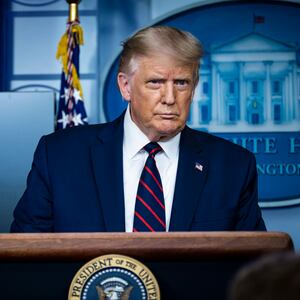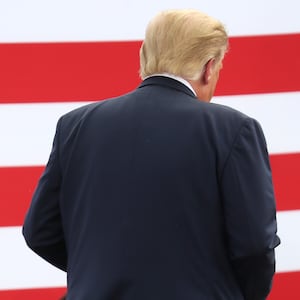As the White House increasingly shifted to re-election mode in the early months of 2019, Jared Kushner told his father-in-law one of the key promises of his 2016 campaign had to be fulfilled to make his 2020 reelection chances “super-strong.”
“Number one, build the wall and get the immigration numbers down. That’s a promise that’s not being kept,” Kushner said to the president, according to Bob Woodward’s new book, Rage, noting it was “the signature campaign issue” of 2016.
Except, according to Trump’s public comments at the time, the wall was already well underway.
“We have just built this powerful Wall in New Mexico. Completed on January 30, 2019—47 days ahead of schedule! Many miles more now under construction! #FinishTheWall,” Trump tweeted in February 2019, posting a video of a section of fence installed in 2006 undergoing repairs.
The comments from Kushner are among a string he made in interviews with Woodward or that Woodward reported. And, like the others, they portray the president’s son-in-law as both the most important adviser in the White House and someone who couldn’t quite grasp how government works—even though he was handed responsibility for wide swaths of it.
That depiction comes through at various points during the COVID crisis as Kushner is given the job of ramping up testing and medical supplies. Woodward paints a picture of a young, business-minded executive trying to leverage connections and statistics in an effort to beat back a pandemic. But he also quotes Kushner talking about Trump’s objectives in shockingly political terms.
“The goal” with Trump, Kushner said in the midst of a spike in cases over the summer, “is to get his head from governing to campaigning.”
In Woodward’s telling, Kushner’s concept of politics is clearly shaped by his father-in-law, whom he appears to revere. He tells the author at one point that Trump has done a “hostile takeover” of the Republican Party, whose members—he surmises—are largely drawn to Trump’s personality.
“I don’t think it’s even about the issues,” Kushner is quoted as saying. “I think it’s about the attitude.”
Kushner fashions himself the ultimate Trump-whisperer. In one 2018 conversation, described in the book, Kushner said Senate Majority Leader Mitch McConnell and then-Speaker of the House Paul Ryan came to him to see how they could keep Trump from constantly changing his mind.
“[I]t’s not that he changes his mind. It’s that he wasn’t staffed correctly,” Kushner said to the Republican leaders. “People weren’t giving him all the facts and so he found out different facts. So you can’t try to trick him into making a decision and then expect he’ll hold to that decision.” (Former White House chief of staff John Kelly summed up Kushner’s theory in one word, “Crazytown.” )
Kushner’s attitude toward the press is even more dismissive. He describes reporters to Woodward as mindless controversy hounds who will chase any shiny object tossed in front of them.
“It’s like a buffet,” he says, “where they’ll always eat the worst thing you give them.”
Kushner describes Trump as seemingly going out of his way to kick up certain arguments, believing that he can manipulate the media into covering topics he likes.
“Controversy elevates message,” Kushner says. And by this, Woodward writes, he means that “a controversy over the economy… only helps Trump because it reminds voters that the economy is good. A hair-splitting, fact-checking debate in the media about whether the numbers were technically better decades ago or in the 1950s is irrelevant.”
But Kushner’s outward confidence in the pages of Rage is often undermined by his actual performance. In one meeting in February 2020, Woodward describes Kushner being told that the government had built only 1 mile of border wall in a location where no wall previously existed.
“It’s more complicated than I thought,” he conceded to the meeting attendees.
Kushner’s over-simplified plan to bring peace to the Middle East was met with consternation from then-Secretary of State Rex Tillerson who thought Kushner “relied too much on economic development and ignored all the hard issues between Israel and Palestine.”
“If you make the economic benefits big enough people will say yes,” Kushner said to Tillerson.
Tillerson, according to the book, responded, “These people are not going to care about your money. Or they’ll take your money and five years from now, you’ll be right back where you are today. That’s not going to buy you peace.”
If Kushner comes off as struggling to stay afloat, others in Woodward’s book seem to have drowned entirely. Trump himself can barely maintain his attention during the 18 interviews he did with Woodward, routinely reverting to rote talking points or comments about TV ratings when asked substantive questions, the author writes. Through it all, he showed no introspection, Woodward adds. As the COVID-19 pandemic raged in late July, Woodward asked Trump what grade he would give himself for handling the virus.
“I give ourselves an A,” Trump replied. “But the grade is incomplete, and I'll tell you why. If we come up with the vaccines and therapeutics, then I give myself an A-plus.”
And it wasn’t just domestic affairs where Trump stumbled. Woodward writes that during the president’s first official international trip as president, to Tel Aviv, Tillerson was rushed into a room at Kushner’s behest as Trump was raging over a video Israeli Prime Minister Benjamin Netanyahu had shown him that purported to reveal Palestian Authority president Mahmoud Abbas “ordering the murder of children.”
Tillerson, Woodward wrote, immediately thought the video was “faked or manipulated.” But he waited until Netanyahu left to tell Trump, “You realize that that whole thing was fabricated?” Trump dismissed Tillerson’s warning and the next morning during a meeting with Abbas “unloaded in a tirade.”
“Murderer!” Trump said to Abbas, according to Rage. “Liar! I thought you were this grandfatherly figure that I could trust. Now I realize you are nothing but a murderer. You tricked me!”
Woodward notes that Kushner disputed Trump’s reaction to the video, describing it as “much calmer.”
Kushner isn’t the only adviser portrayed as out of his depth. Brad Parscale, the former Trump campaign manager, is described as both innovative in the fields of marketing and data collection, and painfully overconfident about the talents he possesses. Towards the end of February, Woodward spoke with him about the state of the campaign, which was just about to enter the informal general election phase.
“They will make movies about us someday,” Parscale responded. After the 2020 election, he added, “my guess is there will be a huge rush of people wanting to befriend me. A lot of people think he’s going to win.”
By mid-July, Parscale had been demoted.




